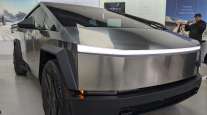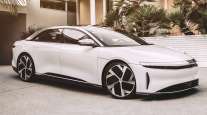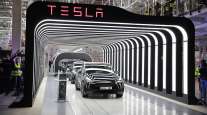Bloomberg News
Musk Spared From Testifying in Tesla Autopilot Crash Suit

[Stay on top of transportation news: Get TTNews in your inbox.]
Elon Musk won’t have to testify in the first case set for trial that blames Tesla Inc.’s Autopilot for a fatal crash, a Florida judge said.
The ruling shielding the company’s CEO from being questioned by lawyers for the deceased driver’s family is a significant win for the electric car maker.
Without a deposition of the billionaire entrepreneur, it will be harder for the family to argue that Tesla made irresponsible decisions under his leadership about marketing its driver-assistance software at the expense of safety.
The company’s nearly trillion-dollar valuation is partly built on Musk’s championing of autonomous driving as the way of the future.
Tesla has shown that Musk “does not have unique personal knowledge of the issues in the case,” Florida Circuit Court Judge Janis Keyser wrote in a brief ruling.
The lawsuit stems from the 2019 death of Jeremy Banner, 50, who died when his Tesla Model 3 crashed into the underside of a semi-trailer truck crossing a Florida highway. The case is scheduled to go to trial Sept. 20 in Palm Beach County.
The Banner family claims Tesla didn’t fix Autopilot so it would shut down in dangerous circumstances despite a similar accident at a traffic crossing in 2016 that killed another Florida man who had engaged the technology.
Tesla’s lawyers have argued the company has been open and honest about Autopilot’s limitations, including the difficulty of detecting traffic crossing in front of its cars. The company warns drivers on its car screens and owner’s manual that drivers must be alert and ready to take control of vehicles at any time, according to its lawyers.
Trey Lytal, an attorney representing the Banner family, argued at a March 10 hearing that Musk’s deposition is central to the dispute because only he can answer the question of why Tesla would “allow this dangerous technology to be used on a roadway where the car knows it’s going to fail.”
Keyser previously rejected Lytal’s request to question Musk early in the pretrial evidence-gathering phase of the case.
Want more news? Listen to today's daily briefing above or go here for more info
Since then, Banner’s attorneys have had a chance to take depositions from almost half a dozen, high-level Tesla engineers, including Christopher “CJ” Moore, the former director for Autopilot who has since gone to work for Apple Inc. on its self-driving project.
But Lytal told Keyser at the hearing that none of the Tesla engineers could answer why the company ignored warnings from government safety regulators and others to stop marketing Autopilot as a technology “with full self-driving capability when it wasn’t.”
Musk has “unique personal knowledge about this,” Lytal said. “That’s why we need to depose him. Nobody else can answer this question,” he said.
Tesla’s attorney, Vincent Galvin, countered that the demands to question Musk are just harassment. The engineers have answered relevant questions, “so the fact that the plaintiff doesn’t like the answers is not a basis for Mr. Lytal taking Mr. Musk’s deposition,” Galvin said.




